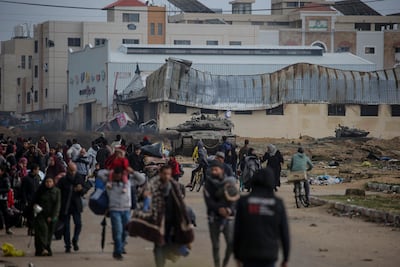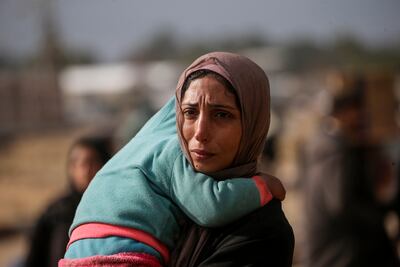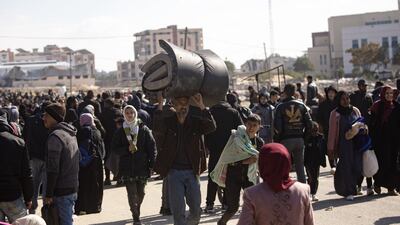Live updates: Follow the latest news on Israel-Gaza
The UN agency supporting Palestinian refugees is set to lose hundreds of millions of dollars in vital funding after other western countries joined the US on Saturday to announce they would freeze their financing of the organisation.
The US, the largest donor to the UN Relief and Works Agency, said it was halting any further funding after UNRWA on Friday said that several of its employees had been accused of taking part in the deadly attacks on Israel that sparked the war in Gaza, and were under investigation.
Canada, the UK, Italy, Finland, Netherlands, Germany and Australia have since said they would suspend funding to UNRWA, whose facilities in Gaza have been sheltering tens of thousands of people displaced by the conflict.
Israeli Foreign Minister Israel Katz has called for the agency to be "replaced with agencies dedicated to genuine peace and development".
According to its website, the agency has since 2021 yielded a total pledged amount of around $1.2 billion annually.
The head of UNRWA has urged those countries that have suspended funding to reconsider their decisions.
“It is shocking to see a suspension of funds to the agency in reaction to allegations against a small group of staff, especially given the immediate action that UNRWA took by terminating their contracts and asking for a transparent independent investigation," UNRWA chief Philippe Lazzarini said late on Saturday.
“UNRWA is the primary humanitarian agency in Gaza, with over two million people depending on it for their sheer survival. Many are hungry as the clock is ticking towards a looming famine."
The accused employees have been dismissed and the agency was investigating the allegations. The US was the first to announce it would suspend funding to the agency while the allegations were investigated.

“The Department of State has temporarily paused additional funding for UNRWA while we review these allegations and the steps the United Nations is taking to address them,” State Department spokesman Matthew Miller said.
The suspension of funding threatens its operations in the West Bank, Gaza, Lebanon, Syria, and Jordan – where the agency provides hundreds of thousands of Palestinian refugees with education, healthcare, welfare services, financial assistance, infrastructure projects and emergency response.
Critics have said the funding cuts amount to the collective punishment of Palestinian refugees, many of whom rely on UNRWA relief and services to survive.
More than 100 UNRWA employees have been killed since Israel’s offensive on the strip began, making it the deadliest conflict for the UN yet in such a short amount of time.
The US contributed $369 million to the agency in 2023. Canada last year pledged $100 million over four years. The UK had committed $109 million for 2023-24. Italy and Australia had pledged a combined $31 million.
The funding row comes amid growing desperation among Gaza's civilian population after more than three months of Israeli bombardment and ground battles in the small coastal enclave.
The Israeli army has intensified its operations in the south, where most of the population was forced to flee as its initial campaign focused on northern Gaza. Israel says it is seeking to eradicate Hamas, the group that rules Gaza and carried out the October 7 attacks that killed about 1,200 people in southern Israel.
Israeli troops also want to rescue the remainder of about 240 people taken hostage by Hamas in the attack.
The Health Ministry in Gaza said on Saturday that about 174 people were killed and 310 wounded by Israeli attacks in the previous 24 hours, raising the Palestinian death toll to at least 26,257 and 64,797 injured since Israel launched its military offensive.
At least three people were killed in an air strike on a home in Rafah on Saturday morning as Israeli forces pressed on with their offensive that has left hospitals in the south unable to function and forced Palestinians into ever-shrinking designated safe areas.
Two women were among those killed in the strike on a house belonging to the Al Siksik family in the Jneina neighbourhood of the city, which also left many injured, medical sources told The National.
Witnesses reported heavy artillery shelling in western areas of Khan Younis, southern Gaza's main city, and near the Nasser Medical Complex, the largest functioning medical facility in the south, in the early hours.

There were fierce clashes between Israeli troops and Palestinian fighters in several areas of Khan Younis, they said.
Hospitals in the south have received the bodies of at least 70 people killed in Israeli attacks in Khan Younis and Rafah since Friday, medical sources said.
The Gaza health ministry said Israeli strikes also hit in the vicinity of Al Amal Hospital run by the Palestinian Red Crescent Society.
The PRCS said on Saturday that the hospital and the society's headquarters in Khan Younis were under Israeli siege for a sixth consecutive day, preventing its ambulance teams from collecting people in need of treatment. The hospital is hosting about 7,000 people who sought refuge from Israeli bombardment.
Health Ministry spokesman Ashraf Al Qudra said the Israeli bombardment was compromising health care and endangering the lives of doctors, patients and displaced people sheltering in hospitals.
About 150 staff, 350 patients and hundreds of displaced families at the Nasser Medical Complex were facing “catastrophic conditions”, the ministry said.
The war has already destroyed most of Gaza's health centres and created acute shortages of food, medical supplies and other essentials as a result of strict Israeli controls on aid allowed into the territory.
Dr Al Qudra said about 600,000 people in northern Gaza were facing death from hunger, the spread of disease and Israeli air strikes.
The Palestinian Red Crescent accused the Israeli army of preventing the delivery of food and relief supplies to the northern part of the strip.




















